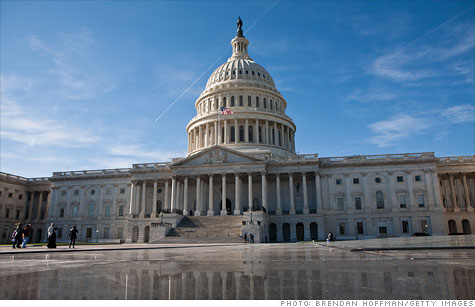Search News

Once again, lawmakers are at odds over budget cuts with time running out. At issue: Payroll taxes, jobless benefits and fees to Medicare doctors.
NEW YORK (CNNMoney) -- What a mess.
Once again, Congress is going down to the wire on a "must-pass" bill that lawmakers have been debating for months. The centerpiece of this one -- the soon-to-expire payroll tax cut -- affects more than 160 million people.
And it looks like lawmakers' hyper-politicized grudge match will continue for at least several more days.
So much for Silent Night.
To review: Last week, House Republicans passed a one-year extension of the tax cut as well as long-term emergency federal unemployment benefits and the "doc fix," which would prevent a scheduled pay cut to Medicare physicians.
But the GOP also included "pay for" provisions to offset the cost of the extension opposed by Democrats, including cuts in the cost of the federal workforce and more stringent requirements to get unemployment benefits.
This weekend, unable to negotiate a more palatable deal, the Senate passed a mere two-month extension of all three measures, and paid for them in large part by requiring that Fannie Mae and Freddie Mac charge mortgage lenders higher fees, a measure with bipartisan support.
The House was expected to vote on the Senate bill on Monday night. But the GOP pushed the matter to Tuesday.
Earlier Monday, House Speaker John Boehner predicted the bill would be voted down since he and rank-and-file GOP members objected to the stopgap measure, which would ensure another fight in February, when primary season will be underway.
Now it appears the House won't even hold a direct vote on the Senate bill; instead, it will vote to say that it wants to reopen negotiations with the other chamber.
The bottom line: With the clock ticking, the fate of the extensions is very unclear.
Many politicians and economists have pushed to keep the tax cut and unemployment benefits in place for another year so as not to hurt an already slow economic recovery.
Allowing the tax cut and jobless benefits to expire could slice 1% to 1.5% off economic growth, economists say.
If the House accepted a two-month extension, IHS Global Insight's chief economist Nigel Gault told CNNMoney he didn't think that would hurt his growth forecast, since the expectation remains that Congress would then back another 10-month extension to follow.
Payroll tax cut extended: The Senate bill would extend the payroll tax cut, set to expire on Dec. 31, through Feb. 29.
That means workers would only pay 4.2% on the first $110,100 of their wages into Social Security. That is 2 percentage points below the normal 6.2% rate.
Were the payroll tax cut to be extended for all of 2012 -- which both parties say they want -- workers would save anywhere from several hundred dollars if they're low-income to more than $2,000 if they earn six figures.
Estimated cost of a two-month extension: $20.4 billion.
Jobless benefits extended: Emergency federal unemployment benefits, also scheduled to expire on Dec. 31, would be extended through February. Without that extension, an estimated 1.8 million jobless workers in January could run out of benefits, which average $296 a week.
Those emergency benefits make it possible for the unemployed to get unemployment checks for up to 99 weeks of benefits in total. Whether they can collect that maximum depends on their state's unemployment rate and their work history.
Congress has extended the long-term emergency benefits several times since 2008.
Estimated cost: $8.5 billion.
"Doc fix" extended: The bill would prevent a scheduled 27% cut in payments to Medicare physicians for the first two months of next year.
Under the law, Medicare reimbursements to doctors must be reduced whenever those payments exceed a certain target. Since 2003, that target has been exceeded, but Congress has routinely prevented those pay cuts.
The American Medical Association has noted that even with the regular intervention by Congress, Medicare payments lag 20% behind the cost of caring for seniors.
Many in Congress would like to pass a permanent doc fix, but the biggest stumbling block to doing so is figuring how to pay for the estimated $300 billion cost over the first decade.
Estimated cost: $3.6 billion.
Paying for the bill: The Senate bill calls for mortgage financing giants Fannie Mae (FNMA, Fortune 500) and Freddie Mac (FMCC, Fortune 500) to charge lenders more to guarantee repayment of new loans. Fannie and Freddie play a central role in the housing market by purchasing mortgages from banks and bundling them into mortgage-backed securities.
Estimated to raise: $36 billion.
What didn't make the cut: Not every loose end was accounted for in the Senate bill. (Read: Bush tax cuts - The real endgame)
Left out was any action on a host of other "temporary" tax breaks that expire this year. These include the research and development credit for businesses and a state and local sales tax deduction for individuals.
Also left out was the usual fix to protect the middle class from getting hit by the Alternative Minimum Tax when they file their taxes for 2012.
Congress could extend the breaks next year and make them retroactive to Jan. 1. ![]()
| Overnight Avg Rate | Latest | Change | Last Week |
|---|---|---|---|
| 30 yr fixed | 3.80% | 3.88% | |
| 15 yr fixed | 3.20% | 3.23% | |
| 5/1 ARM | 3.84% | 3.88% | |
| 30 yr refi | 3.82% | 3.93% | |
| 15 yr refi | 3.20% | 3.23% |
Today's featured rates:
| Latest Report | Next Update |
|---|---|
| Home prices | Aug 28 |
| Consumer confidence | Aug 28 |
| GDP | Aug 29 |
| Manufacturing (ISM) | Sept 4 |
| Jobs | Sept 7 |
| Inflation (CPI) | Sept 14 |
| Retail sales | Sept 14 |